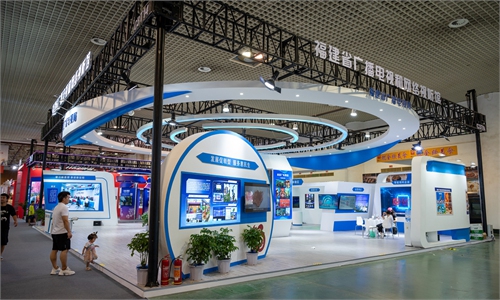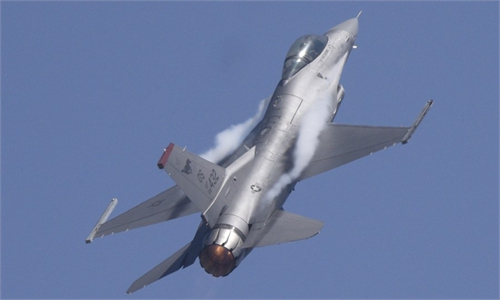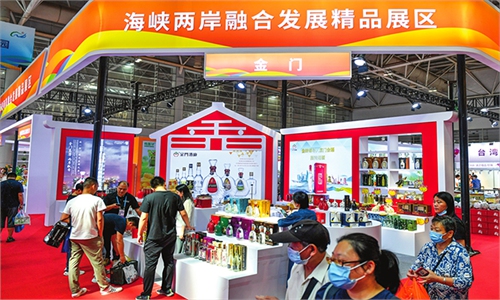China condemns US' arrangement for Lai Ching-te's 'stopover'; DPP candidate a 'dangerous troublemaker to bilateral ties'
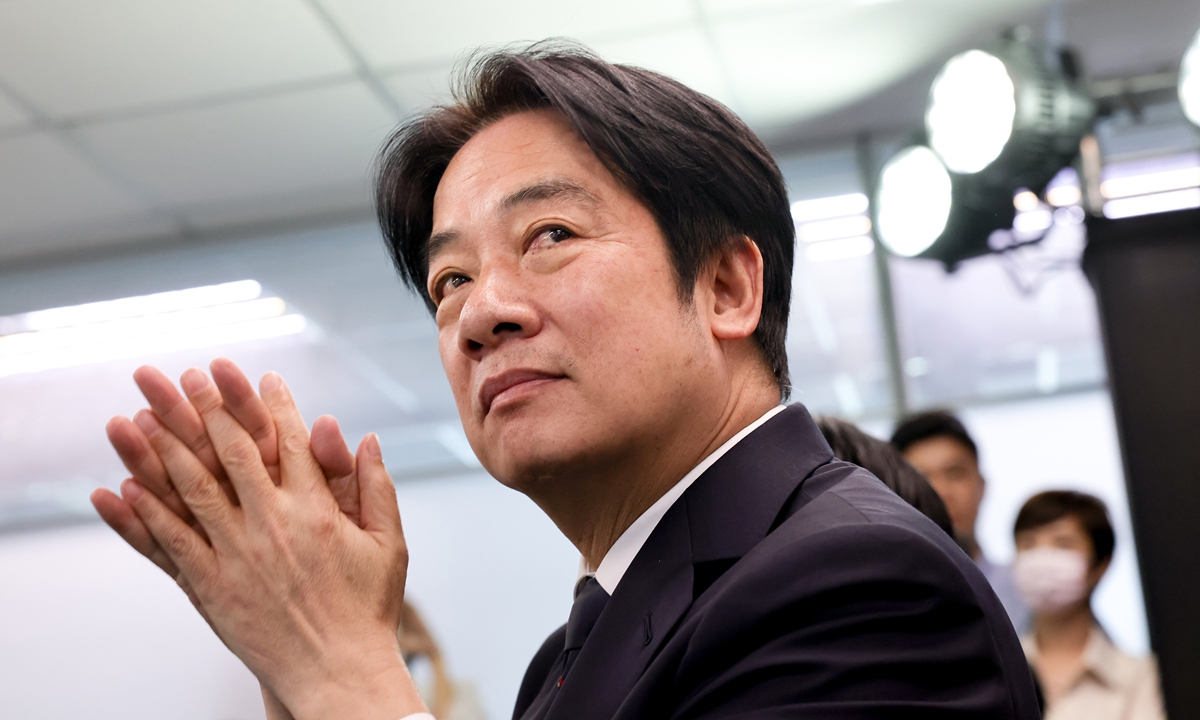
DPP candidate Lai Ching-te. Photo: VCG
China sent a firm signal to the US on Sunday as Washington deliberately arranged a "stopover" in the US for the deputy regional leader of Taiwan island Lai Ching-te, who is also a candidate of the separatist Democratic Progressive Party (DPP) for 2024 Taiwan regional election, with analysts saying that China-US relations face new challenges due to the trouble made by Taiwan separatist forces.According to Chinese Maritime Safety Administration, a military exercise will take place in the East China Sea from Saturday to Monday. The Eastern Theater Command of the Chinese People's Liberation Army (PLA) on Sunday, via its WeChat public account, released information about combat drills conducted by fighter jets of the air force.
Experts said Chinese military forces will respond according to the extent of provocation from now to the conclusion of Lai's trip and returns to Taiwan, and China will pay close attention to what the US will arrange for Lai, and who will meet the separatist Taiwan politician during his "stopover" in the US.
The Chinese Foreign Ministry said on Sunday in a statement that China firmly opposes any form of official interaction between the US and Taiwan region and firmly opposes any visit by "Taiwan independence" separatists to the US in any name or under whatever pretext.
Lai clings stubbornly to his separatist position for "Taiwan independence." He is a troublemaker through and through. The US and the Taiwan authorities arranged for Lai to engage in political activities in the US in the name of having a "stopover," the ministry's spokesperson said in a statement, stressing that China deplores and strongly condemns the US decision to arrange the so-called "stopover" for Lai.
Lai arrived in New York on Saturday as a transit stop en route for a visit to Paraguay, Politico reported. His first stopover will only be about 24 hours and Lai will leave New York City on Sunday to attend the inauguration of Paraguay's president-elect, Santiago Peña Palacios, the report said.
Lai will transit overnight in San Francisco on Tuesday on his way back to Taiwan island, Politico reported.
This kind of arrangement seriously violates the one-China principle and gravely undermines China's sovereignty and territorial integrity. The fact once again shows that the fundamental cause of the continued tensions in the Taiwan Straits is the Taiwan authorities' attempt to solicit US support for "Taiwan independence" as the US remains bent on using Taiwan to contain China, the Chinese Foreign Ministry said.
China is closely following the developments of the situation and will take resolute and strong measures to safeguard its sovereignty and territorial integrity, it said.
On July 17, US State Secretary Antony Blinken said that Lai's transit through the US is a "routine" matter, and he asserted that the US has not changed its "one-China policy" or its stance on the Taiwan question.
Li Haidong, a professor at the China Foreign Affairs University, told the Global Times on Sunday that the US' explanation for its arrangement for Lai shows that Washington wants to manage the situation but that it is still quite tricky, because "having official connectivity with the island's authorities has already violated the one-China principle, and more importantly, Lai is not just a deputy leader of the island, but an extreme separatist, so the US statement and actions just prove that the US is hollowing out its 'one-China policy.'"
"Tolerating or arranging any official activities of Taiwan separatist politicians or leaders of Taiwan authorities in the US will be seen as a violation of the US promise to 'oppose Taiwan Independence,' and other US acts on the Taiwan question including arms sales to the island have already violated US commitments to China, so Washington should not complain if the Chinese military takes countermeasures against provocations," Li Haidong noted.
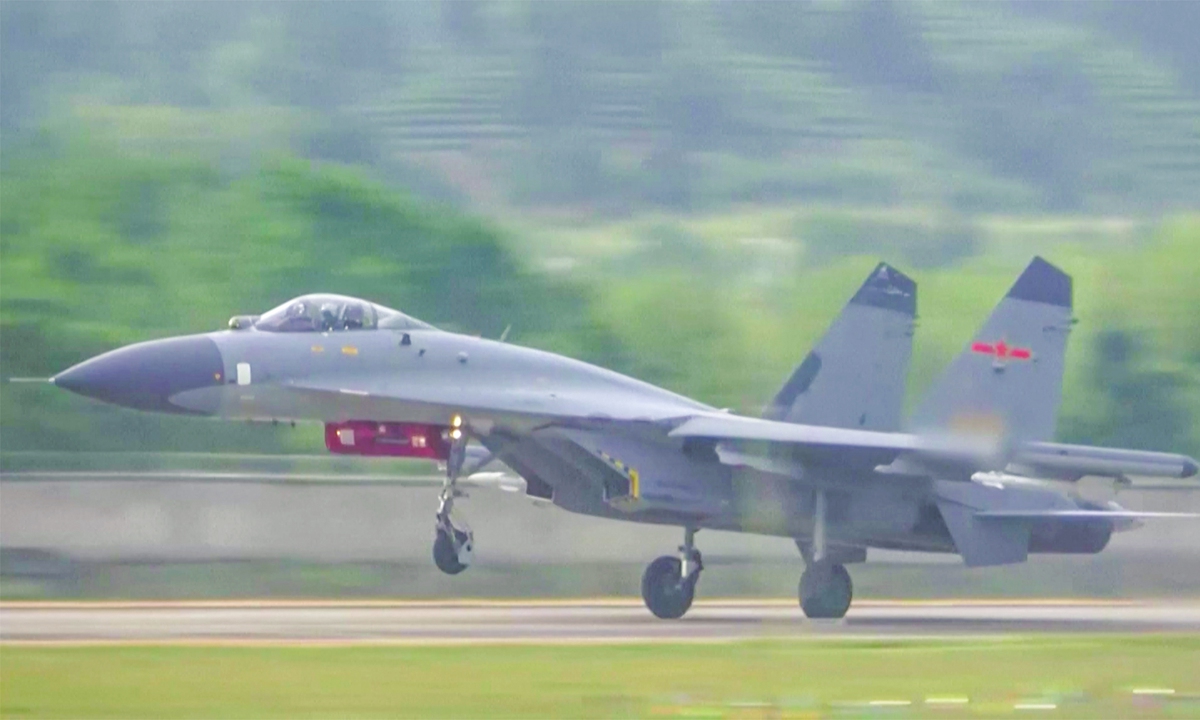
A J-11 fighter jet takes off from an undisclosed airfield on August 3, 2022. The Chinese People's Liberation Army Eastern Theater Command conducted realistic combat-oriented joint exercises in the sea and air space around the island of Taiwan on the day. Photo: VCG
Unwelcome troublemakerOne day before Lai's planned "stopover" in the US, more than 600 people from 60 political parties and civil organizations held a rally on Ketagalan Boulevard in Taipei, protesting against his separatist provocations which may ratchet up tensions across the Taiwan Straits. They called on the DPP authorities to recognize the 1992 Consensus and seek peace and development with the Chinese mainland.
The Chinese Consulate General in New York also voiced strong opposition on Sunday toward Lai's "transit" in New York on his way to Paraguay, saying that the outrageous acts of flattering the US and betraying Taiwan and Taiwan compatriots will never succeed.
The US is using underhanded measures to obscure and hollow out the one-China principle, using salami slicing tactics to constantly challenge China's red line and make "breakthroughs." The fact that the US has repeatedly reneged on its commitments on the Taiwan question can't help but make people question the sincerity of the US in keeping President Biden's commitments to stabilize and improve China-US relations, the consulate general said.
Zhu Fenglian, a spokesperson for the Taiwan Affairs Office of the State Council, firmly voiced opposition on Sunday to Lai Ching-te's activities in the US under any pretext or in any form. We firmly oppose Lai's actions that harm Taiwan by "soliciting US support for 'Taiwan independence,'" and firmly oppose the US' indulgence and support for "Taiwan independence" advocates and their separatist actions in any form, she said.
"Taiwan independence" is utterly incompatible with peace and stability across the Taiwan Straits. Such actions will ultimately push Taiwan toward the perilous brink of military conflict, bringing serious calamity to people on the island, Zhu said.
Li Fei, a professor at the Taiwan Research Center at Xiamen University, told the Global Times that a key purpose for Lai to go to the US is that he, as a candidate for the Taiwan regional leader election in 2024, wants to seek support from the US political circle for his separatist stance, and also listen to the voices from US politicians and even the Biden administration via open or secret activities in America.
"Lai and DPP will benefit from the China-US tension as they expect the US to keep using the island of Taiwan to contain China and encourage 'Taiwan Independence' to provoke China, even if this causes more military tensions or direct military conflict. However, what Washington wants is slightly different, as on the one hand the US wants to use Taiwan as a pawn on its chessboard to compete with China, on the other hand, the Biden administration is not ready for the situation caused by Taiwan separatist forces to get out of control," Li Fei noted.
According to a report by the Financial Times on July 20, US officials asked the Taiwan authorities to clarify Lai's "contentious remarks about White House visits," highlighting doubts over his approach to relations with the Chinese mainland if he get elected in 2024.
At a recent campaign event, Lai claimed his separatist view that when Taiwan's regional leader "can enter the White House, the political goal that we're pursuing will have been achieved." His statement worried the Biden administration which does not want to lose control of bilateral ties with China, according to the FT.
From the provocative visit of then US House Speaker Nancy Pelosi to the island in August 2022 to Taiwan regional leader Tsai Ing-wen's meeting with US House Speaker Kevin McCarthy in April, the US and the international community have witnessed what China would do to respond to the provocation, and the world has learned that "the more encouragement the US sends to Taiwan separatists, the more dangerously tensions will build up around the island, and the more likely that the Chinese mainland will be forced to solve the Taiwan question by force once and for all," Li Fei said.
The US should understand that Lai and Taiwan separatists like him are the troublemakers that could bring danger to the US, and they are the risks that could cause China-US ties to get out of control. The US needs to take concrete actions to prevent the danger from happening rather than sending wrong signals to encourage or tolerate Taiwan separatists' activities, experts said. China will pay close attention to see what and how the US does in its engagement with the Taiwan separatist politician Lai during his "transit" stay in America, and then decide how to respond to the provocations, they noted.



